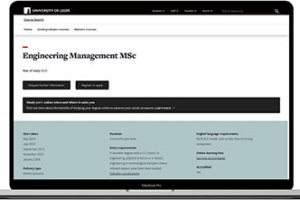4 Disruptive Technologies Changing the Future of Engineering

As developments in science and technology continue to progress globally, emerging business models and consumer demands are transforming industries such as engineering at high-speed.
Disruptive technologies are innovative changes that impact the direction of growth for organisations. A previous example includes the world-changing Internet Revolution of the 1990’s which has overhauled everything from the way individuals communicate, shop, study and work, to how organisations do business.
The impact, optimisations, and adoptions of disruptive engineering technology such as VR and 5G are crucial for engineering managers to understand. This will keep them up to date with shifting demands and help them implement changes to futureproof their own organisations.
In this article, we assess four of the most disruptive technologies that are impacting the engineering sector.
1. Augmented and virtual reality
The first in our list of disruptive technologies is augmented reality (AR) and virtual reality (VR).
In an increasingly virtual world, these tools can help engineers design and visualise 3D data such as construction initiatives in real-life scenarios.
Augmented reality is an interactive experience which overlays imagery, video, or text onto a physical landscape, typically on a smartphone device. This is being adopted increasingly by maintenance professionals and even medical engineers who can view, learn, and implement repairs in direct view of them.
Although typically viewed through a VR headset, virtual reality works in a similar fashion, offering a simulated experience of a real-world environment. Engineers can utilise this by demonstrating what full-scale designs such as architecture could look like in real life, whilst helping them make suitable adjustments to outline designs accordingly.
2. 5G
5G is the latest generation of networking impacting all things engineering from the research and development stage through to design and manufacturing. Leading mobile provider Vodafone outlines the benefits of faster speeds, lower latency, and a more reliable connection. But, outside of the consumer market, 5G is also rapidly facilitating advanced new engineering solutions with the arrival of smart cities and autonomous driving to name a couple.
According to the National League of Cities, 66% of cities in the US have invested in some type of smart technology such as lampposts with 5G-connected sensors that automatically brighten when someone is walking nearby. Meanwhile, the reduced latency of 5G will provide autonomous vehicles with safety information on roadworks, fast moving emergency vehicles and hidden pedestrians at a fraction of the standard human reaction speed.
For engineers, 5G will dramatically improve the way buildings and structures are designed, vehicles are manufactured, and the operations and management of transport facilities. Faster connectivity will also help engineering managers collaborate with their teams more effectively and efficiently.
3. Big data
Whilst 5G increases the speed of accessing information, big data supports engineers in identifying and analysing trends in a range of areas such as health and safety and costings. With access to an exceptionally large volume of data, strategies can then be developed around this information to tailor projects and improve efficiency.
In construction, big data science enables engineers to assess statistics such as health and safety near misses and accidents that occur. This information can then be scrutinised to detect risks and reduce the chance of accidents occurring in the future. Alongside this, by assessing patterns in costings and wastage, engineers can also predict budgets for upcoming projects more accurately, reducing expenses and improving profitability.
4. Artificial Intelligence
Similarly, artificial Intelligence (AI) is another one of the emerging disruptive technologies which can interpret a large amount of data; however, it can also learn from this data to support autonomous tasks that previously relied solely on human input.
In design, engineers can utilise AI software to identify structural defects that may not be picked up by the naked eye, which could be crucial from an operational or health and safety perspective. And interestingly, in medical engineering, AI can even be applied to programme surgical robots, training them to work autonomously and assist in complex surgical tasks with more precision and control than standard techniques.
Why is an understanding of emerging technologies so important to Engineers?
One of the greatest challenges for engineering managers is to maintain a good understanding of emerging and disruptive technologies and be ready to adopt them when the time is right. Failure to do so could result in wasted resources or competitors may have developed an unassailable lead in a new product type or business model.
If you want to become a multiskilled professional at the forefront of engineering and the emerging technologies impacting it, you should consider becoming an engineering manager with the help of our specialised Masters. Our module in disruptive technology will introduce you to a range of modern technology areas across science and engineering. Not only will this give you an understanding of emerging technologies, it will also outline how they can be effectively adopted by engineering managers.
Why study the Engineering Management MSc online at the University of Leeds?
The Engineering Management MSc at the University of Leeds is delivered 100% online, giving you the flexibility to learn whilst working. The course is specifically designed for engineers and will enable you to apply the advanced management techniques and practical skills that tomorrow’s business leaders will need. It’s ideal if you are:
- In the early stages of your career and looking to fast-track your progression.
- An ambitious professional with substantial industry experience.
- Already working in engineering management or are new to a management role and looking to develop your skills.
- A busy professional and/or working abroad and unable to study full-time on-campus.

Did you enjoy this blog? Here's some related engineering content that you may be interested in:
Want to learn more about our online Engineering Management course?

Check out the course content and how to apply.

